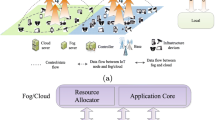Abstract
The rapid growth of IoT devices and applications with data-intensive processing has led to energy consumption and latency concerns. These applications tend to offload task processing to remote Data Centers in the Cloud, distant from end-users, increasing communication latency and energy costs. In such a context, this work proposes a dynamic cost model to minimize energy consumption and total elapsed time for IoT devices in Mobile Edge Computing environments. The solution presents a Time and Energy Minimization Scheduler (TEMS) that executes the cost model, validated through simulation, which resulted in a reduction in energy consumption by up to 51.61% and in task completion time by up to 86.65%.
Access this chapter
Tax calculation will be finalised at checkout
Purchases are for personal use only
Similar content being viewed by others
Notes
- 1.
MEC Simulator available at https://github.com/jlggross/MEC-simulator.
References
Aijaz, A.: Towards 5G-enabled tactile internet: radio resource allocation for haptic communications. In: 2016 IEEE Wireless Communications and Networking Conference Workshops, pp. 145–150 (2016)
Gupta, A., Jha, R.K.: A survey of 5G network: architecture and emerging technologies. IEEE Access 3, 1206–1232 (2015)
Haouari, F., Faraj, R.: Fog computing potentials, applications, and challenges. In: 2018 International Conference on Computer and Applications, pp. 399–406 (2018)
Jansson, J.: Collision avoidance theory with application to automotive collision mitigation. Ph.D. thesis (2005)
Liu, Y., Yang, H., Dick, R.P.: Thermal vs energy optimization for DVFS-enabled processors in embedded systems. In: 8th International Symposium on Quality Electronic Design, pp. 204–209 (2007)
Matteussi, K.J., Geyer, C.F.R., Xavier, M.G., Rose, C.A.F.D.: Understanding and minimizing disk contention effects for data-intensive processing in virtualized systems. In: 2018 International Conference on High Performance Computing Simulation (HPCS), pp. 901–908 (2018). https://doi.org/10.1109/HPCS.2018.00144
Matteussi, K.J., Zanchetta, B.F., Bertoncello, G., Dos Santos, J.D.D., Dos Anjos, J.C.S., Geyer, C.F.R.: Analysis and performance evaluation of deep learning on big data. In: 2019 IEEE Symposium on Computers and Communications (ISCC), pp. 1–6 (2019). https://doi.org/10.1109/ISCC47284.2019.8969762
Ravindranath, L., Bahl, P.: Glimpse: continuous, real-time object recognition on mobile devices. In: Proceedings of the 13th ACM Conference on Embedded Networked Sensor Systems, pp. 155–168 (2015)
Sarangi, S.R., Goel, S., Singh, B.: Energy efficient scheduling in IoT networks. In: Proceedings of the 33rd Annual ACM Symposium on Applied Computing, pp. 733–740 (2018)
Wang, C., Dong, C., Qin, J.: Energy-efficient offloading policy for resource allocation in distributed mobile edge computing. In: 2018 IEEE Symposium on Computers and Communications, pp. 366–372 (2018)
Yu, H., Wang, Q., Guo, S.: Energy-efficient task offloading and resource scheduling for mobile edge computing. In: 2018 IEEE International Conference on Networking, Architecture and Storage, pp. 1–4 (2018)
Acknowledgment
This study was financed in part by the Coordenação de Aperfeiçoamento de Pessoal de Nível Superior - Brasil (CAPES) - Finance Code 001. PROPESQ-UFRGS and by projects: “GREEN-CLOUD: Computação em Cloud com Computação Sustentável” (#162551-0000 488-9) and SmartSent (#172551-0001 195-3) from FAPERGS, PNPD Capes, and CNPq Brazil, program PRONEX 122014.
Author information
Authors and Affiliations
Corresponding author
Editor information
Editors and Affiliations
Rights and permissions
Copyright information
© 2020 Springer Nature Switzerland AG
About this paper
Cite this paper
Gross, J.L.G., Matteussi, K.J., dos Anjos, J.C.S., Geyer, C.F.R. (2020). A Dynamic Cost Model to Minimize Energy Consumption and Processing Time for IoT Tasks in a Mobile Edge Computing Environment. In: Kafeza, E., Benatallah, B., Martinelli, F., Hacid, H., Bouguettaya, A., Motahari, H. (eds) Service-Oriented Computing. ICSOC 2020. Lecture Notes in Computer Science(), vol 12571. Springer, Cham. https://doi.org/10.1007/978-3-030-65310-1_8
Download citation
DOI: https://doi.org/10.1007/978-3-030-65310-1_8
Published:
Publisher Name: Springer, Cham
Print ISBN: 978-3-030-65309-5
Online ISBN: 978-3-030-65310-1
eBook Packages: Computer ScienceComputer Science (R0)




